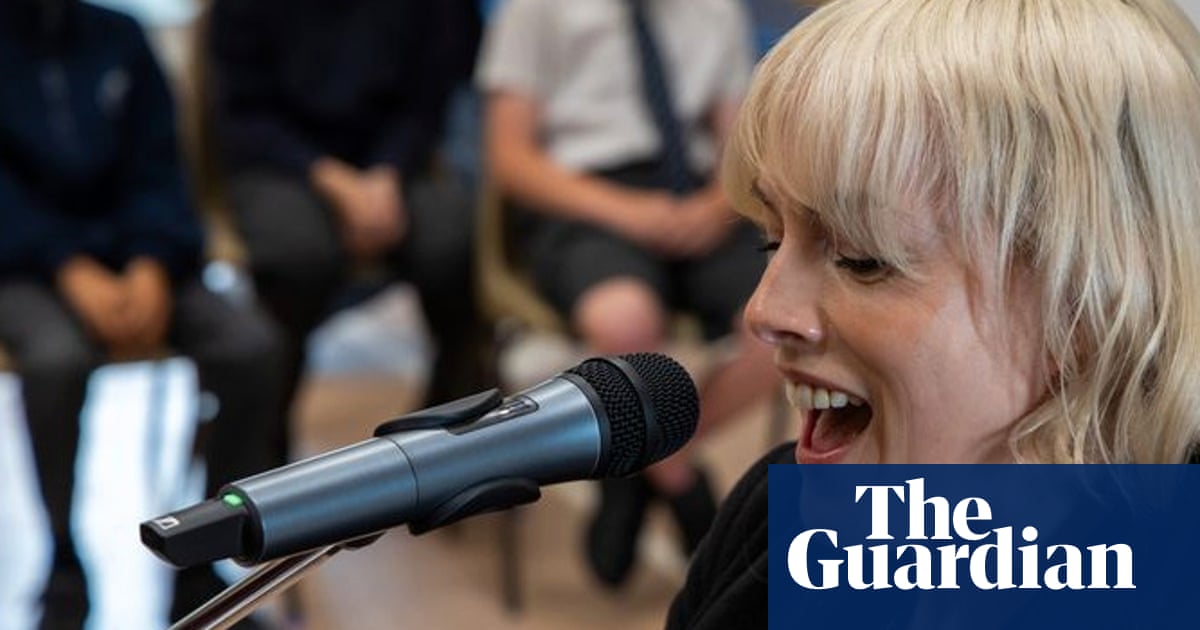The Mercury prize-nominated Cornish/Welsh singerGwenno Saundershas said that Cornish should be more widely taught to children in the far south-west of Britain to protect the language and preserve local culture.
Gwenno spoke after visiting a school in the fishing village of Mevagissey on the south coast of Cornwall before a performance at the nearbyLost Gardens of Heligan.
Year 5 pupils at Mevagissey community primary school joined her in singing. She covered an eclectic range of subjects, from the importance and vitality of Kernewek (Cornish) to rebellions of the 15th and 16th centuries – and cheese.
Gwenno, whose parents are a Cornish poet and Welsh language activist, sings in Cornish, Welsh and English. She said: “The children in Mevagissey weren’t that familiar with the language because they don’t have access to it. I think it would be really useful for it to be on the curriculum. It’s really nourishing for children to learn about local heritage and history in a language that is from the place where they live.
“It’s so easy in a very globalised world to feel like everything’s the same and there’s only one way of doing things. Having local strains of history and language and accents gives you a sense of place and sense of community and creativity.”
Gwenno was nominated for the Mercury prize in 2022 forher acclaimed third record, the Cornish-language Tresor. She is appearing at theHeligan Homecoming festivalon Thursday 19 June as part of a lineup of artists, comedians and thinkers exploring the themes of home and belonging. She last performed a gig in Cornwall at theMinack theatrein 2023.
Among the songs Gwenno performed for the children in Mevagissey was Den Heb Taves, meaning “a tongueless man”. Gwenno said: “It’s about losing your language and how that contributes towards losing your grounding and your footing.”
She also spoke to the children of the Cornish rebellion of 1497, partly a response to hardship caused by the raising of taxes by Henry VII to go to war, and the Prayer Book Rebellion of 1549.
“Children love those sorts of really deep, dark, big ideas,” Gwenno said. “I think that when you go into school and you’re having a conversation it’s really important to try and push it emotionally and intellectually.
“Often people think: ‘Oh well, we’ve lost our language because it wasn’t important or it was irrelevant’ and actually, so often it’s systematic and it’s structural why a language dies or almost dies.”
She said she wanted to convey to the children that Cornish was an integral part of her life. “The language is something that’s part of my life and part of my home life and I think if a language comes from that I think it has a real chance to thrive.”
Cornwall council believes there are about 500 advanced Cornish speakers and 2,000 with basic levels of Cornish. It has designed a free initiative called Go Cornish for Primary Schools to promote the language and culture.
It says Cornish culture is “thriving” with more peoplegetting involved with programmesand events celebrating Cornish food, heritage, sports and music.
Gwenno also sang a rousing song with the Mevagissey children about cheese called Eus Keus? (Is There Cheese?). “I thought we should probably lighten it. The thing about any language or culture is that you’ve got to find the absurd in it and the humour. It’s really cathartic to shout about cheese. It was fun to do. I’ll be singing that till I’m 90 if I’m still here.”
The Heligan Homecoming festival takes place on selected dates between 13 and 22 June 13. For details go toheliganhomecoming.co.uk
